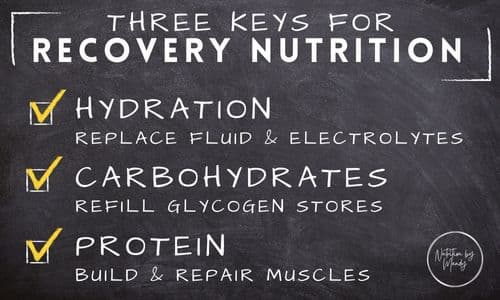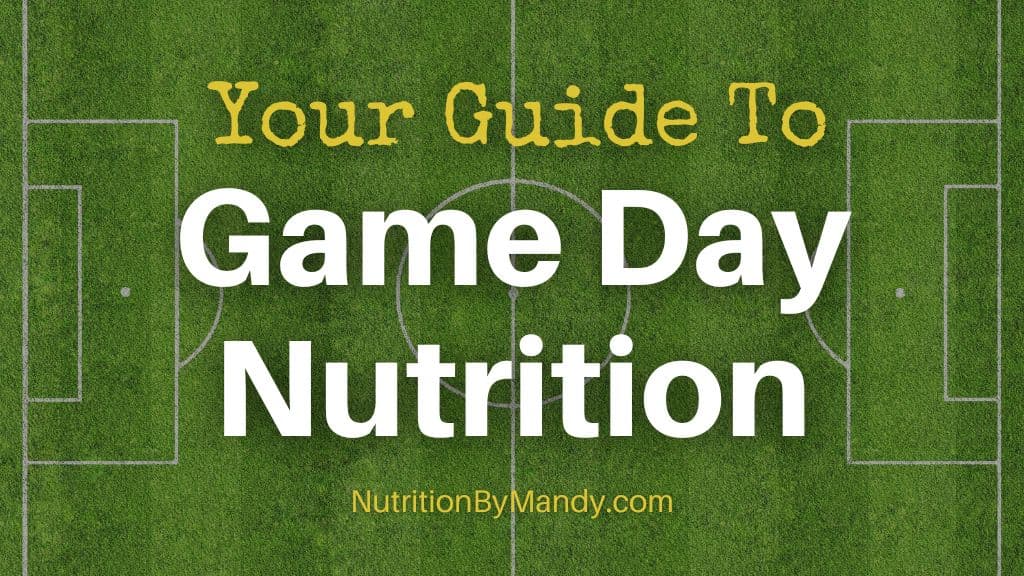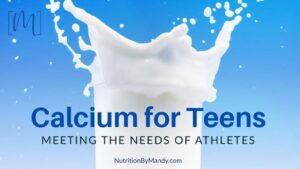Last Updated on August 29, 2023 by Mandy Tyler, M.Ed., RD, CSSD, LD
Your Guide to Game Day Nutrition
As an athlete, taking time to put together a game day nutrition plan is important. Similar to fueling a race car with premium gas, if you want your body to perform at its best, you need to provide your body with premium fuel.
Let’s take a look at game day nutrition strategies to ensure you are fueled for optimal performance.
Game Day Nutrition: Pre-Event Meal
When possible, schedule your pre-event meal to be eaten 3-4 hours prior to the competition. This will provide time for your body to digest the meal prior to the event. It also allows time to go to the restroom before the competition if needed.
Plan for your pre-event meal plan to include a good source of carbohydrates and a moderate amount of lean protein. You also want the pre-event meal to be low in fat and fiber.
Example Pre-Event Meals:
- Pasta with grilled chicken, bread sticks, fresh fruit cup, water
- Turkey sub sandwich, pretzels, apple slices, sports drink
- Salmon, rice, corn, dinner roll, sports drink
- Bagel with nut butter and and a fruit smoothie

As the start time of the event approaches the size of the pre-event meal you eat should decrease. In addition, as you get closer to the start of the event, your focus should be on consuming carbohydrates for energy.
Eating foods that are high in fat, fiber, and protein too close to the competition may cause GI distress during the activity (1).
Hydration with the Pre-Event Meal
Going into the event optimally hydrated is important for athletes. It is recommended to drink 5-7 mL/kg of body weight of fluid approximately 4 hours prior to the event (2).
For a 175-pound athlete, this would be ~13 – 19 fluid ounces. In general, consuming approximately 2 cups of fluid with the pre-event meal can assist you with meeting this goal.
Consuming foods that contain sodium with the pre-event meal will help your body hold onto the fluid you consume. Salty foods also make you thirsty, which can further assist with meeting your hydration needs (2).
Game Day Nutrition: 60 Minutes Before the Event
In the hour before the event, it is best to stick with carbohydrate-rich pre-game snacks that will provide the body with quick energy for the activity.
Ideas for high-carbohydrate snacks include:
- Banana or small piece of fruit
- Applesauce squeeze, dried fruit
- Fig bars, granola bars, mini bagels
- Pretzels, pita chips, snack crackers
- Sports drinks, chews, gels
Hydration – 60 Minutes Before the Event
In the hour leading up to the event continue hydrating. Aim to drink around 8 oz of water or a sports drink during this time period.
Game Day Nutrition: During the Event
During the event, the main nutrition goals are to replace the carbohydrates used for energy, along with the fluids and electrolytes lost in sweat.
Athletes participating in endurance exercise lasting over an hour or in team sports that involve frequent starting/stopping can benefit from consuming carbohydrates during activity (1).
Drinking sports drinks during the event can help athletes meet their carbohydrate needs and also replenish fluids and electrolytes. Depending on individual preferences and GI comfort, athletes can also consume gels, chews, or a few bites of a sports bar to meet their carbohydrate needs.
If your sport has a halftime, make sure to use this break to rehydrate and refuel for the second half of the competition.

Hydration During the Event
During the event it is important to replace the fluid and electrolytes lost in sweat. The goal during the event is to minimize the amount of dehydration that occurs. Dehydration can negatively impact performance and increase the risk of heat illness (2).
Individuals vary greatly in regard to the amounts of fluids and electrolytes lost in sweat. Therefore, it is best to have an individualized hydration plan that meets your specific needs.
Calculating Sweat Rate
To determine your individual fluid replacement needs you can calculate your sweat rate. This is done by weighing yourself before and after the activity to determine your change in body weight. The change in body weight reflects fluid loss in sweat.
The Gatorade Sports Science Institute has an online Fluid Loss Calculator that can help athletes calculate hourly sweat rate during exercise.
Keep in mind the amount you sweat will vary based upon several factors, including:
- Uniform and equipment worn
- Temperature and humidity
- Type of exercise
- Exercise intensity
When calculating your sweat rate for competition, make sure to do so in an environment as close to the actual competition as possible.
Game Day Nutrition – Post-Game Recovery
Recovery nutrition is particularly important for athletes when the amount of time between competitions is limited. For example, athletes who are participating in a tournament or who have games two days in a row should make recovery nutrition a priority.
Following activity, athletes should focus on replacing the carbohydrates used for energy during the event, consuming protein to build and repair lean muscle mass, and replacing fluids and electrolytes lost in sweat.
Hydrating Following a Game
It is important for athletes to rehydrate following a game, making sure to replace both fluids and electrolytes. If the athlete weighed before and after activity, the change in body weight can help the athlete with determining their post-game hydration needs. For each pound of weight lost during the activity, athletes should aim to drink 20-24 oz fluid (1).
Consuming sodium following a competition, in either food or beverages, can help athletes with replacing the sodium lost in sweat. In addition, sodium helps athletes to better retain the fluid consumed after exercise (2).

Post-Game Meals
Eating a well-balanced post-game meal following an event can support athletes with meeting their recovery nutrition needs.
Example post-game meals athletes can enjoy following a competition include:
- Burrito bowl with rice, chicken or steak fajitas, black beans, corn salsa, guacamole and a sports drink
- Grilled salmon, sweet potato, steamed broccoli, dinner rolls, and tart cherry juice
- Grilled chicken sandwich, baked chips, fresh fruit, low-fat chocolate milk

Practice Your Game Day Nutrition Plan
Just as you practice the plays your team will run during the game; it is important to practice your game day nutrition plan. Take time to figure out what foods and beverages work best for you.
Having a well-practiced sports nutrition plan in place can provide you with confidence on game day that you are fueled to perform at your best.
Game Day Nutrition – What About Pre-Workout Supplements and Energy Drinks
When putting together your game day nutrition plan, questions may arise regarding the use of pre-workout supplements and energy drinks.
Use Caution with Pre-Workout Supplements
It can be tempting to think a pre-workout supplement is necessary to provide you with the energy needed for competition. Use caution with pre-workout supplements, as many contain added stimulants and mega-doses of nutrients that are not necessary prior to exercise.
If you are reviewing a pre-workout supplement, consider the following:
Is the supplement third-party tested?
Sports supplements are not regulated by the Food and Drug Administration in the same way that food is. When a supplement is third-party tested an outside organization has evaluated the supplement for accuracy of ingredients.
Two companies that evaluate sports supplements are NSF International Certified for Sport and Informed Sport.
Does the supplement contain a proprietary blend?
Many supplements contain a proprietary or confidential blend of ingredients. The supplement label will typically list the ingredients within the blend, but not amounts.
Use caution with proprietary blends. If a product label does not tell you the name of the ingredient and the amount included, you cannot evaluate the potential effectiveness of the product.
Bottom line, if you don’t know what’s in the supplement, don’t take it
In addition to caffeine, what stimulants does the product contain?
Many pre-workouts contain a variety of ingredients aimed at causing a stimulatory effect. These may be included in the pre-workout as an “energy blend.”
Ingredients such as synephrine, green tea extract, and yerba mate all have stimulatory effects on the body and are often found in pre-workout supplements. The combination of stimulants may have a synergistic effect and be dangerous to your health.
Are the dosages of ingredients included in the pre-workout based on research?
It is common to find mega-doses of vitamins, particularly B vitamins, in pre-workouts. Many pre-workouts also contain ingredients such as creatine and beta alanine, but not always in the dosages shown by research to be effective.
Use caution if you are using a pre-workout in addition to other supplements. The combination of ingredients from multiple supplements could result in overly high doses of vitamins or other ingredients.
Similar to all dietary supplements, recognize that pre-workout supplements have the risk of being contaminated by banned substances. If you have questions on a pre-workout supplement, seek out guidance from a sports dietitian nutritionist.

Energy Drinks
Similar to pre-workout supplements, energy drinks often contain a proprietary blend of ingredients. The proprietary blends may include ingredients such as: caffeine, taurine, B Vitamins, guarana, green tea extract, L-carnitine, ginseng, ginger root, and chromium. The combination of ingredients in the drink may have a synergistic effect in the body and lead to health concerns.
If you have followed the game day nutrition strategies shared above, you should have the energy you need to perform at your best.
If you feel you are lacking in energy, make sure you are getting enough sleep each night to allow your body time to rest and recover. Also consider meeting with a sports dietitian nutritionist who can create an individualized meal plan to meet your specific sports nutrition needs.
Game Time!
You are now equipped with game day nutrition strategies to help you perform at your best. Remember to practice these strategies before competition to find the foods and fluids that work best for you.
For additional sports nutrition ideas on what to eat before, during, and after activity, check-out my blog Snacks for Football Players – How to Fuel Your Workouts.
Join the Nutrition By Mandy Email List & Get a Free Athlete’s Grocery List
Click HERE to join the Nutrition By Mandy e-mail list. When you join you will receive a free athlete’s grocery list to print and take with you to the store.
About the Author
Mandy is a Sports Dietitian Nutritionist in the San Antonio, TX area. She is a Registered and Licensed Dietitian, a Board-Certified Specialist in Sports Dietetics, a Licensed Athletic Trainer, and is a Certified Exercise Physiologist through the American College of Sports Medicine. Mandy has experience working with athletes at the high school, collegiate, and professional levels. She believes the key to reaching one’s full potential, both in everyday life and in sports performance, relies on a healthy nutritional foundation. Learn more about the work Mandy does here.





